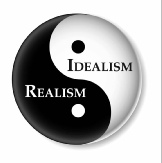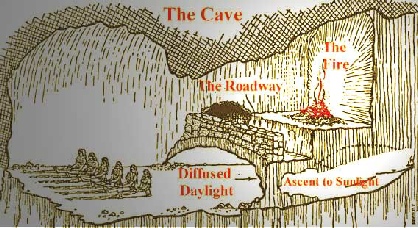



 NEXT
NEXT
 BACK
BACK
 Forum
Forum


Philosophical musings on Quanta & Qualia; Materialism & Spiritualism; Science & Religion; Pragmatism & Idealism, etc.





The Idea of the World
A multi-
Bernardo Kastrup (2019)
Dutch computer scientist
https://www.amazon.com
Post 88. June 19, 2019
Reality is a Theory
Learning to Deal with Ambiguity
In his astute defense of a modern scientifically respectable version of Platonic Idealism, The Idea of the World, Bernardo Kastrup quotes a presumably atheist materialist cosmologist’s admission that objective reality1 — as we know it — is only a model created in the human mind, hence an idea :
“Let us remember that our knowledge of the world begins not with matter but with perceptions. I know that my pain exists, my “green” exists, and my “sweet” exists. I do not need any proof of their existence, because these events are a part of me; everything else is a theory.” [ My bold ]
___ Andrei Linde, theoretical physicist (cosmological inflation)
Kastrup seems to have implicitly interpreted this remark as a veiled acceptance of the logical implications of the ancient Greek philosophical worldview of Idealism. That is, our know-
The perennial Real vs Ideal quandary results from the dual nature of mankind. We are constrained within the physical limits of our natural bodies (subjective), but via self-
“We interpret the contents of perception as coming from a world outside mind because this seems to explain the fact that we all share the same world beyond the boundary of our skin, as well as the fact that laws that govern this world do not depend on our personal volition.”
___Bernardo Kastrup, The Idea Of The World
Kastrup's mission was to undermine the materialistic axioms of modern science — not with sophistry2 & hand-
Post 88 continued . . . click Next
Opposite sides of same coin
1. Conventional Reality :
Most human cultures have held dual notions of what is real. The most common (conventional, scientific) view is that what we know with our physical senses is real. A minority view (philosophical, religious) is that ultimate or “true” reality exists hidden from our sensory functions.
Unfortunately for the com-
So, the BothAnd principle holds that the world in which we exist is both physical (conventional reality) and meta-
2. Sophistry :
Plato criticized some of his fellow philosophers in the Greek world for their com-
3. Two World Systems :
Empirical Evidence versus Theoretical Doctrines; phys-
4. Dealing with Ambiguity
Over the years, I’ve ham-
https://markmanson.net/trust
1. You Are Biased and Selfish Without Realizing It
2. You Don’t Have A Clue about What Makes You Happy (or Miserable)
3. You Are Easily Manipulat-
4. You Generally Only Use Logic and Reason To Support Your Preexisting Beliefs
5. Your Emotions Change Your Perceptions Way More Than You Realize
6. Your Memory Sucks
7. ‘You’ Aren’t Who You think You Are
8. Your Physical Experience of the World Isn’t Even That Real



